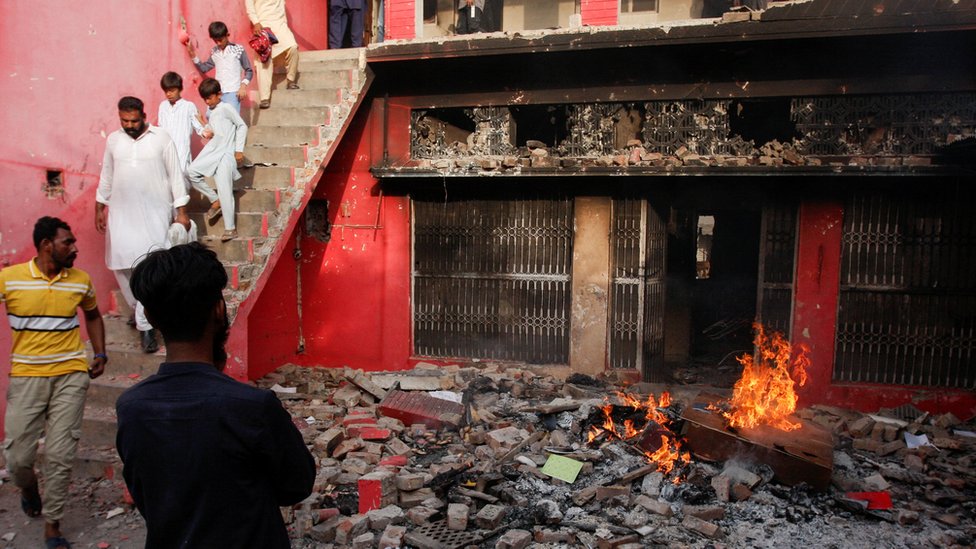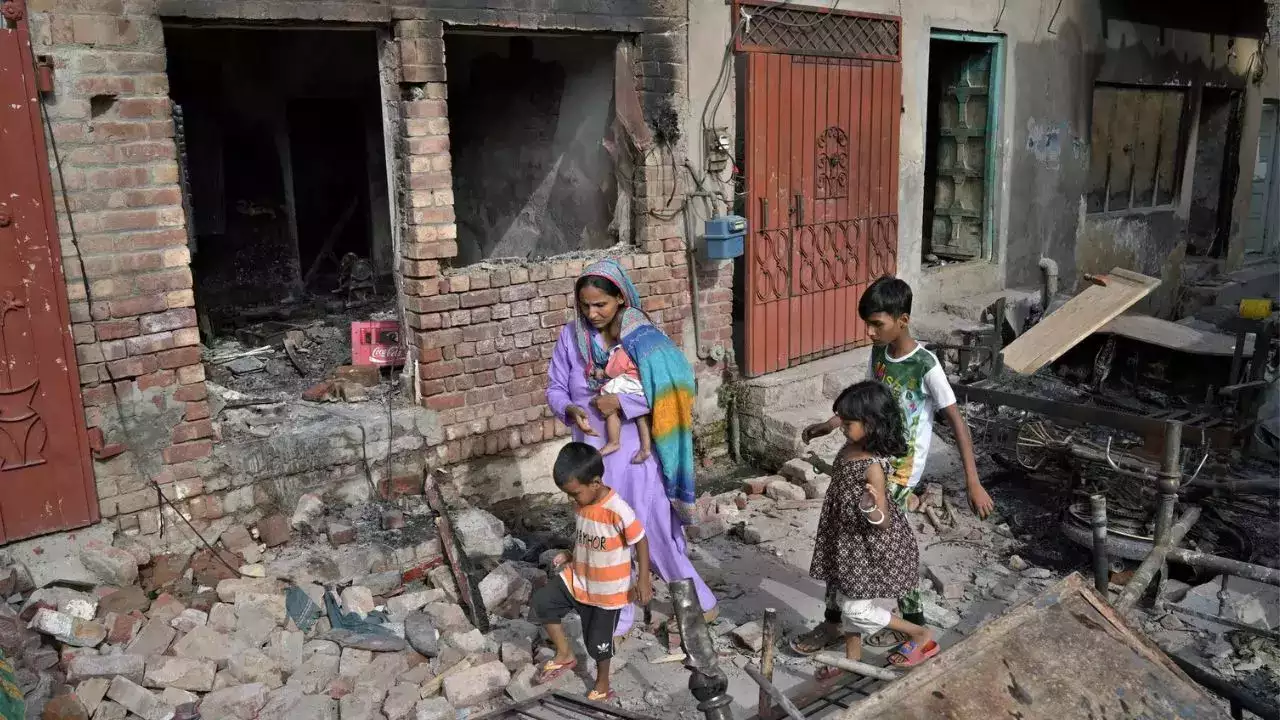Pakistan’s Christians live in fear of mob justice

Over the past couple of months, since the Quran burning incident in Sweden, Pakistan has witnessed an increasing number of allegations of blasphemy cases against Christians.
In one specific case, the allegations in the first information report (FIR) filed with police included claims that the blasphemous content praised the Quran burning in Sweden. While police have managed to quell the anger in certain areas, they were not able to prevent the mob violence that targeted localities where Christian families lived.
The first case of blasphemy was filed on 30 June 2023. On 28 June 2023, Haroon Shahzad created a Facebook account in his name where he posted verses from the Bible regarding sacrifice. It also happened to be the day when Muslims around the world were celebrating Eid-ul-Ada with religious zeal and passion.
Hassan, Tuasik and Muhammad Imran read this post and filed an FIR stating that Haroon had hurt the feelings of Muslims on the occasion of Eid. Therefore, Haroon now stands accused of blasphemy. The FIR against Haroon Shahzad – who lives in Shumali District of Sargodha – was filed on 30 June 2023 at police station Cantt Sargodha under sections 295A and 298 of the Pakistan Penal Code. He initially managed to get bail, but this was later cancelled and the case is still pending in court.
Another case against a Christian was filed in Sargodha Punjab on 8 July 2023. The case was registered by a Muslim man named Muhammad Awais from Sargodha who filed an FIR at police station Sadder Sargodha, under sections 298 and 295A. In the FIR, he named a Christian man, Zaki Masih, who had allegedly posted derogatory words against Muslims through his Facebook account. It also stated that he along with two others tried to persuade Zaki Masih to delete his post, but he refused and supposedly threatened to share it with more people. This was cited as sufficient grounds for their sentiments and religious beliefs to be offended and to file an FIR, heightening tensions in the area.
The third blasphemy case in Sargodha was registered against an unknown person under sections 295A, 295B, 295C and 298A. It was filed by a resident of Green Town, Muhammad Abdulghafar, who retired from the Pakistan Air Force. He claimed that on 16 July 2023, at around 5am when he was coming back from the mosque after his prayers along with his companions, he found a small pamphlet stuck in front of his boundary wall containing blasphemous content. The pamphlet was alleged to have contain disrespectful content against respected figures, and derogatory comments about the Quran. He went on to add that the pamphlet also praised the recent Quran-burning incident in Sweden. The complainant claimed that the pamphlet badly hurt the feelings of Muslims and demanded that the police severely punish the culprits. Nevertheless, in this case, the timely intervention of the police helped restore calm and control the situation.
On 25 August 2023, a fourth FIR was registered at the police station in Kadana, Sargodha, against unidentified persons under section 295 B. In this FIR, the applicant – an imam – claimed that when he reached the mosque at 4:10am that morning, he saw burnt pages of the Quran.
On 16 August 2023, at least 25 churches and 120 houses were burnt to ashes by Muslim mobs in the Christian areas of Jaranwala city, Faisalabad. Most Christian residents of the area fled their homes in fear as a mob of about 3,000 Muslims flooded their streets and started wreaking havoc. Police sources said that the Assistant Commissioner of the Police in the area – a member of the Christian community – was also evacuated after people turned against him. This mob attack followed the arrest of two Christian brothers Raja Amir and Rocky in Jaranwala over blasphemy charges.
So far, the police have arrested about 200 people and they are investigating the matter. The Punjab government has started undertaking the task of renovating some churches. The Pakistani Prime Minister has intervened in the matter and assured compensation for those affected. Some affected families have received cheques of 2 million rupees each (around £5,100 or $6,500). Furthermore, churches, NGOs and even members from the Muslim community have stepped in to assist in the swift rehabilitation of the affected Christian families.
However, on 20 August 2023, a mere four days after the burning and ransacking in Jaranwala, a similar outrage over blasphemy allegations was narrowly averted in Sahiwal. Tensions arose in 186/9-L village when a 27-year-old Christian, Ehsaan Shan Masih, allegedly uploaded a video on social media containing blasphemous images that had triggered the attacks in Jaranwala on August 16. An FIR under sections 295A and B of the Pakistan Penal Code and provisions under the Anti-Terrorism Act 1997 was registered at Dera Rahim Sahiwal.
The next day, a dispute arose in Madinah Town Faisalabad. Some pages of the Quran were found around a Christian house, which the neighboring Muslim family later admitted were wet pages from the Quran that they had left to dry, and which had then fallen from their roof onto the Christian family’s house. This averted an instance of an FIR being registered. Nevertheless, the Christian families in the neighborhood spent the night in fear, and some even fled their homes fearing mob violence.
More recently, on 24 August 2023, a family dispute in Rawalpindi Dhook Saidan turned into a blasphemy case, when one of the uncles of the accused converted to Islam and accused his nephew of blasphemy in order to take his share of the property. Police astutely dealt with this case, but this did not stop the rumor’s from spreading and threatening the well-being of Christians in the neighborhood.
On Friday 25 August 2023, another incident involving a false blasphemy case occurred in the Mochipura area of Kasur city. Just five days prior, a Christian sanitation worker’s family had rented a house in Mochipura. Allegations arose that they had desecrated some papers of the Quran while cleaning a Muslim family’s home. As a result, the Christian sanitation worker and their family promptly left their home and fled.

The situation escalated when Islamic clerics broadcast messages via mosque loudspeakers, urging Muslims in the area to come out of their houses and attack Christian homes. The local Christian community immediately contacted the police, who arrived and managed to defuse the situation. The mob was eventually dispersed without causing any harm.
Despite the police intervention, a sense of fear still lingers in the area. The incident in Jaranwala has left its impact, causing sleepless nights for many residents. In light of these events, the Christians of Mochipura have appealed to higher authorities for protection of their lives and households.
The spate of blasphemy accusations in Pakistan that has followed the recent Quran burning in Sweden has also been accompanied by increased fears of mob violence.
The state’s efforts following the violent attacks in Jaranwala are acknowledged, yet they have arrived too late to alleviate the suffering of those already affected by the mob violence. Christians across Pakistan now live under a constant shadow of fear, apprehensive that they could become targets of revenge-driven attacks fueled by baseless blasphemy allegations within their community. Overcoming the trauma inflicted will require years of effort and support, making it imperative for the government to promptly address this issue and enact necessary reforms.
Pakistan’s controversial blasphemy laws stand in contrast to the human rights conventions ratified by the country. The international community has been consistently voicing its concerns about these laws for many years. Civil society, once subdued, has regained its voice, demanding attention to this long-standing issue. The government cannot afford to overlook this matter any longer.
The present moment necessitates serious efforts by the Pakistani government to curb the ongoing misuse of blasphemy laws against Christians and other minorities. It is imperative that proactive measures are taken to prevent the harassment of the Christian community through such means. By addressing these concerns, Pakistan can demonstrate its commitment to ensuring the rights and safety of its minority populations.
The misuse of blasphemy laws has revealed to the world the treatment of minorities in Pakistan. Urgent action is required to rectify this situation and to prevent further deterioration of religious harmony within the country. Blasphemy laws demand immediate attention, and their reform is a crucial step toward fostering inclusivity and respect for all religious communities.